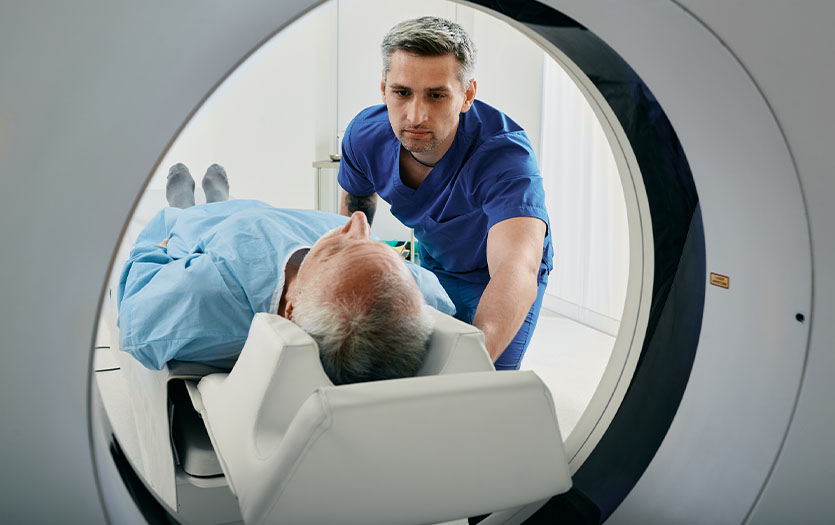
If your doctor has recommended an MRI, you may be curious about what this examination entails. In this post, we will guide you through the process from start to finish, including when an MRI is necessary, how to prepare for it and what to expect during the scan.
What is an MRI?
Magnetic resonance imaging (MRI) is a test that uses a magnetic field and pulses of radio wave energy to take pictures of organs and structures inside the body. Compared to X-rays, ultrasounds or CT scans, an MRI often provides distinct information about bodily structures and can reveal issues that other imaging techniques cannot identify.
There are two main types of MRI:
-
Standard MRI machine: Enclosed scanners typically have stronger magnetic fields, which produce higher-quality and more detailed images.
-
Open MRI machine: This design is generally more spacious and less confining, making it more suitable for claustrophobic patients or larger body types.
When is an MRI needed?
MRI scans can assess nearly any body part, including the brain, spinal cord, bones, joints, internal organs and blood vessels. Doctors use MRI scans to diagnose issues such as:
An MRI can also provide more information about a problem your doctor first detected on an X-ray, ultrasound, CT scan or nuclear medicine exam.
How do I prepare for an MRI?
In most instances, little preparation is needed for an MRI. However, for some stomach scans, you may be asked not to eat or drink for several hours before the test.
Tell your doctor if you get nervous in tight spaces. They may prescribe you medication to help you relax. If you plan to take this medicine, arrange a ride home. It may not be safe for you to drive yourself.
Before the procedure, you may need to remove all or most of your clothing and metal objects, including hearing aids, dentures, jewelry, watches and hairpins, from your body.
While many modern medical implants are MRI-safe, some older non-removable devices, such as pacemakers, cochlear implants and brain aneurysm clips, may not be. Additionally, some body modifications, like dermal piercings, may contain metals that can react to the magnetic field. It's best to disclose any implants or materials within the body that were not present at birth.
What can I expect during an MRI?
During the test, the area of the body being studied is placed inside a special machine that contains a strong magnet. The scan produces digital images that can be saved and stored on a computer for further study. A provider can also review these images remotely, such as in a clinic or an operating room. In some instances, a radiologist or technologist may utilize contrast material during the MRI scan to better visualize specific structures.
The scan usually takes 30 to 60 minutes, though some tests can last as long as 2 hours. During the test, you will not experience pain from the magnetic field or radio waves used for the procedure. However, you may feel tired or sore from lying in one position for a long time. If the radiologist uses a contrast material, you may feel some coolness when they inject the substance through your IV.
In rare cases, you may feel:
-
A tingling feeling in the mouth if you have metal dental fillings.
-
Warmth in the area under examination. This sensation is normal. Tell the technologist if you experience:
-
Nausea
-
Vomiting
-
Dizziness
-
Pain
-
Burning
-
Breathing problems
-
Watch this video for more on what to expect during an MRI.
What are the risks of an MRI?
The magnetic field used for an MRI has no known harmful effects. However, the magnet is very powerful and can affect any metal implants or other medical devices you have.
MRI contrast agents are generally safe but not entirely without risks.
Contrast material that contains gadolinium, a rare earth metal, may be used in this test. Trace amounts of this metal can remain in the body for months or years. However, for most people, the benefit of its use in this test outweighs the risk. Be sure to tell your doctor if you have kidney problems or are pregnant.
If you breastfeed and are concerned about whether the dye used in this test is safe, talk to your doctor. Most experts believe that very little dye passes into breast milk, and mothers pass even less to their babies. But if you are concerned, you can stop breastfeeding for up to 24 hours after the test. During this time, you can give your baby the breast milk that you stored before the test. Don't use the breast milk you pump in the 24 hours after the test. Throw it out.
Results
The radiologist may discuss initial results of the MRI with you right after the test. Complete results are usually ready for your doctor in 1 to 2 days.
Learn more
MRI is just one of many diagnostic imaging tests offered at Parkview's imaging centers. To explore our full range of imaging services, visit our website here.
Copyrighted material adapted with permission from Healthwise, Incorporated. This information does not replace the advice of a doctor.



